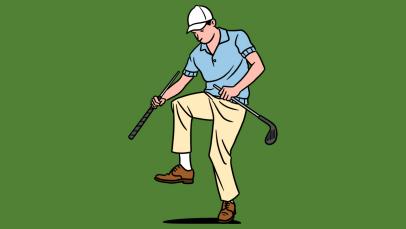This article first appeared in Low Net, a Golf Digest+ exclusive newsletter written for the average golfer, by an average golfer. To get Low Net each week directly to your inbox, sign up for Golf Digest+ right here. Have a topic you want me to explore? Send me an email and I'll do my best to dive in.
My new middle-aged man way of thinking about golf is to compare it to owning a house.
Bear with me: Imagine you bought a cabin on a lake. The day you toured it, the weather was perfect—sunlight streamed in through the big windows, a gentle breeze off the water. In golf, there are rounds when everything seems simple. Your swing feels smooth, the hole looks bigger. Golf ability is often measured by the quality of your best days.
But wait, that’s not everything. Does your new cabin have heat? Does the roof leak when it pours? In ways that extend beyond weather, golf similarly tests your comfort level when things aren’t as pleasant.
The house metaphor points to an essential question when assessing our progress as golfers: how bad is your bad? My handicap index generally measures what my good golf looks like. Accounting for the best eight of my most recent 20 scores, I’m down to a 10.8, and several times recently I’ve flirted with a magic score in the 70s. But I had good days last year, too. More notable might be the other 12 scores. My bad days aren’t as bad—misses that are more manageable, downward spirals no longer as pronounced. Trust me, no one is calling me great. But when the weather turns at my lakefront cabin, I’m less prone to panic.
Learn to go with what you have
In every sport, there is a premium on managing your bad. The sport psychologist Bhrett McCabe points to a story about the Hall of Fame pitcher Trevor Hoffman. There was a game when a younger pitcher, Doug Bochtler, struggled pitching on limited rest and was swiftly given the hook in favor of Hoffman. That night, Hoffman didn’t have his best stuff, either. The Hall of Famer’s fastball was clocking only in the mid-80s, yet he still retired the side with ease.
“You know what the difference was?” Hoffman told Botchler after the game. “They knew you had nothing.”

John Grieshop
To McCabe, the Hoffman story underscored the essential quality of adaptability. Bochtler could only pitch well when he “had it,” whereas Hoffman found a way even when he didn’t.
“Those skills are not technique,” McCabe said. “Those skills are, ‘How do we digest and identify the challenge in front of us and utilize what tools we have that day?’ And that's how we maximize our capacity to compete.”
Determine your ‘unbreakables’
One reason houses with insulation and heat are more valuable than summer cottages is they’re more dependable more days out of the year. We want the same out of our golf games. To McCabe, an overreliance on fleeting fixes can be counterproductive because our brains operate differently from one day to the next.
“Our internal rhythms change, our energies change, our fields change, all of that,” McCabe said. “And when we're trying to force that into a static environment, that paradox crushes us.”
Progress for golfers is not to grasp at new solutions when trouble mounts, but to be able to recognize and return to ones that reliably work. Bhrett mentioned in his own game an important fundamental of squaring his right hand at impact. I referenced how when struggling, I focus on pushing off from my right foot to my left. These are more than “feels.” McCabe calls them “anchors.” Golf Digest Best in State teacher Joe Plecker calls them “unbreakables” in that they never waver from one round to the next.
“Everything I do with students before we start is around these unbreakables in your golf game,” said Plecker, the director of Instruction at The Landings Club in Savannah, Ga. “Once we establish that, we can handle the chaos of the round, as I like to call it. You could get a bad lie. It could be a strong wind. When those conditions are happening, we still focus on those high-value elements that we decided on before.”
Protecting against your worst golf doesn’t mean you stop trying to expand your potential on the other end. Quite the opposite. But like with any structure, you can’t build on what you have without the right foundation in place.





